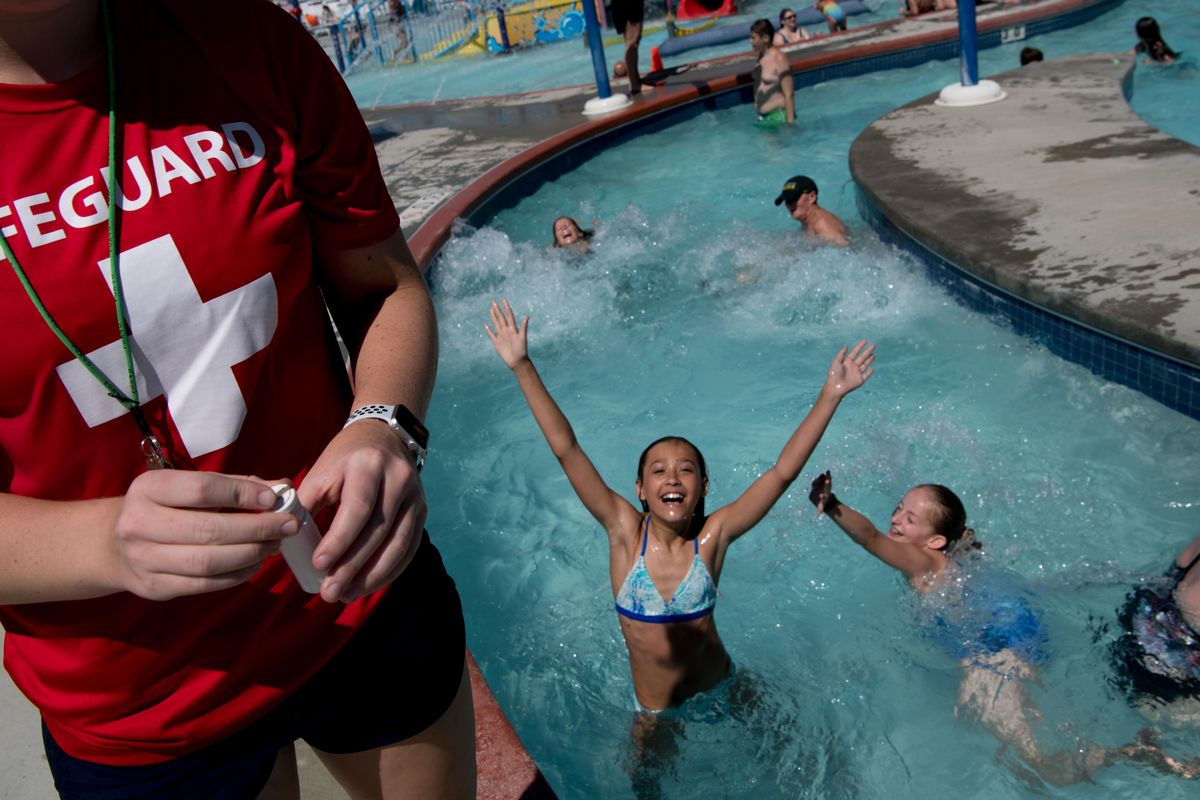Wading into waterborne illness: Spokane County pools have a clean record

Don’t ignore the sign telling you to shower before splashing. Avoid swallowing pool water too.
That is, if you want to avoid getting sick.
These are among tips to prevent waterborne illnesses from bacteria, viruses or other pathogens. One nasty culprit is cryptosporidium, or crypto, a tough parasite linked to diarrhea that can live in chlorinated water up to seven days.
A recent federal study – tracking reports beginning 2000 through 2014 – found nearly 500 waterborne illness outbreaks from recreational water treated with chlorine. Those cases reported by 46 states and Puerto Rico sickened at least 27,219 people, and eight died.
Locally, the waters look clearer. Spokane County health officials report no confirmed waterborne illnesses from treated recreational waters in the past 10 years.
Chlorine doesn’t treat water instantly, said Sandy Phillips, a Spokane Regional Health District technical adviser. “A lot of germs or organisms are killed within minutes, but there’s a few that it takes longer to kill them.
“It’s really important if you’ve been sick, particularly with diarrhea, you shouldn’t be swimming for two weeks after you’ve recovered. Even if you’re feeling better, you could still be shedding bacteria. And don’t go swimming when you are sick.”
Most of the deaths nationally were in people affected by the bacteria legionella, which can cause severe pneumonia.
The Centers for Disease Control and Prevention said the recent federal report found a third of the treated recreational waterborne disease outbreaks over the 14 years occurred in hotel pools or hot tubs. Crypto, pseadomonas and legionella were major causes of outbreaks.
Crypto caused 58 percent of the outbreaks that were traced to swimming pools, hot tubs and water playgrounds. It spreads in pools when someone sick with the parasite has diarrhea in the water and other swimmers swallow that contaminated water.
In Washington, 131 cases of cryptosporidiosis were reported statewide in 2016, said a state Department of Health document that also lists possible sources of contamination as ingestion of fecal-contaminated water, milk or food.
The regional health district regularly inspects public pools and aquatic facilities along with limited-use pools and spas such as at apartment complexes and hotels, Phillips said. Facility operators are required to test water quality.
“We still believe it is safer and healthier to swim in a pool that is chlorinated; we have pretty good operators here,” Phillips said.
At least one large public swim site, the Southside Family Aquatics Facility, has an additional layer of treatment with an ultraviolet light system, which inactivates crypto. The facility also uses chlorine treatment and offers free swim diapers.
Bekah Bennett, Spokane County recreation program manager, said the UV system at the Southside Family Aquatics Facility was installed in 2008 as part of that site’s construction. It’s the only county aquatic facility using UV, she said.
At 3724 E. 61st Ave., the facility has a 3 1/2-foot depth and with its design, “we tend to have more families with young children coming there,” Bennett added.
She said the pool’s UV treatment has a lamp that emits a light of a certain wavelength to kill a wide range of organisms as the water passes through the system.
“It’s a pretty established form of cleaning and filtering the water,” she said. “The UV system is absolutely an extra layer there to kill those bad germs or bugs in the water, but we still use the chlorine system and abide by all the CDC and health district guidelines.
“Even though we have that UV system in place, if we were to have a diarrhea contamination, we still follow all the CDC procedures and super chlorinate the pool to the specified parts per million.”
Phillips reiterated that people do need to stay away from pools if they or their children are sick.
For all others, they should shower with soap first before entering a pool or spa to remove any residual fecal matter and excess body oils, Phillips said.
Young children who aren’t potty-trained and are wearing swim diapers should be taken to the restroom frequently about every 30 minutes to an hour to use the toilet. “If you have a child in diapers, don’t change them on deck. Do it in the restroom as well.
“Don’t swallow pool water; that’s probably No. 1, because of the fact that chlorine doesn’t kill everything right away.”
From 2008 to 2017, Spokane’s health district received combined illness or injury complaints that averaged just over two reports a year, but a majority were related to people being hurt. Among all the complaints, none led to confirmed water-borne illnesses, the SRHD said.
“Some facilities have started to include ultraviolet treatment,” Phillips said. “That’s actually quite effective against those things like cryptosporidium and giardia to give a further level of protection, particularly at a facility being used more by younger children.”
Spas at higher temperatures and smaller wading pools are better environments for bacteria to multiply, so the minimum disinfectant levels are higher at those types of facilities than for larger swimming pools, she added.